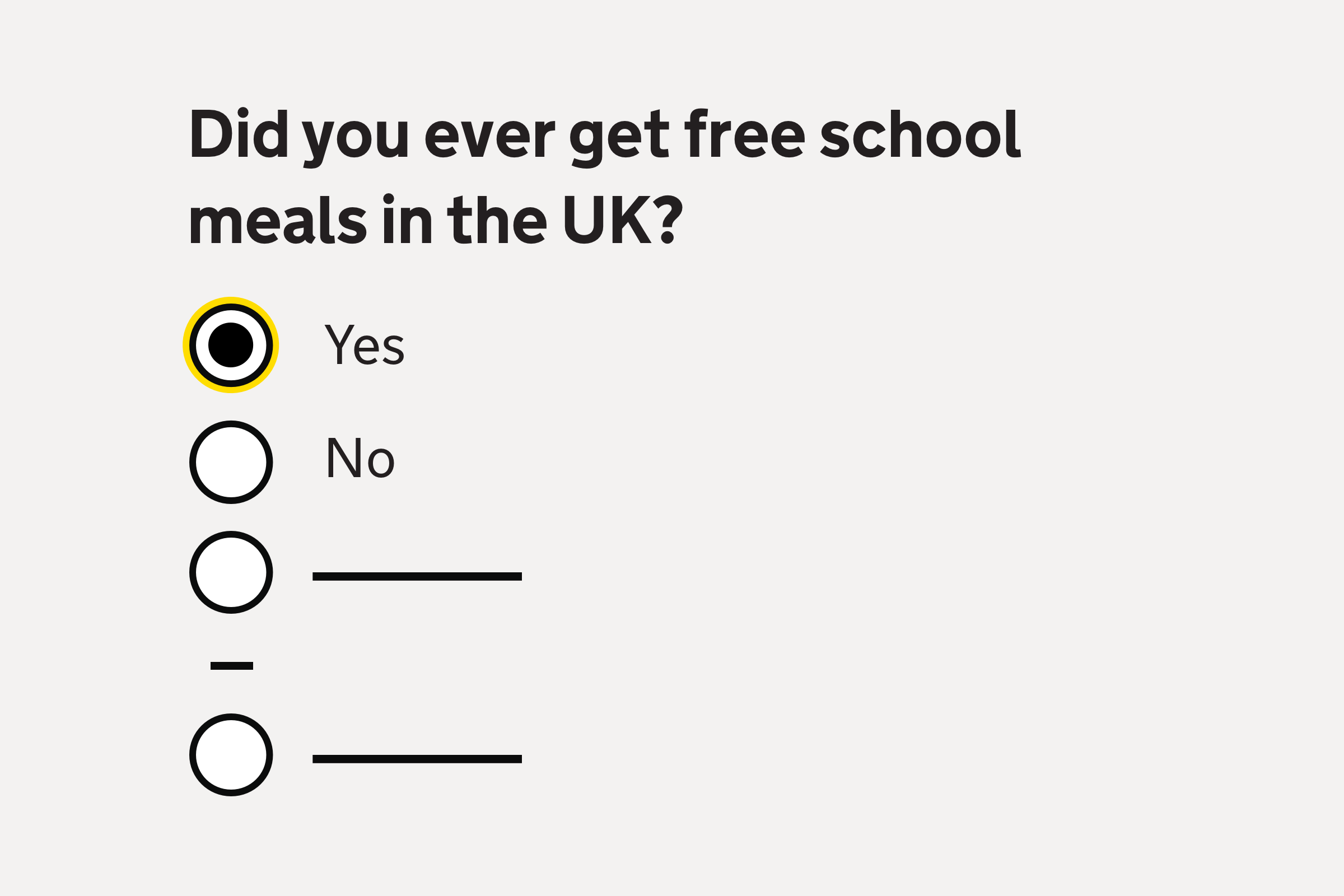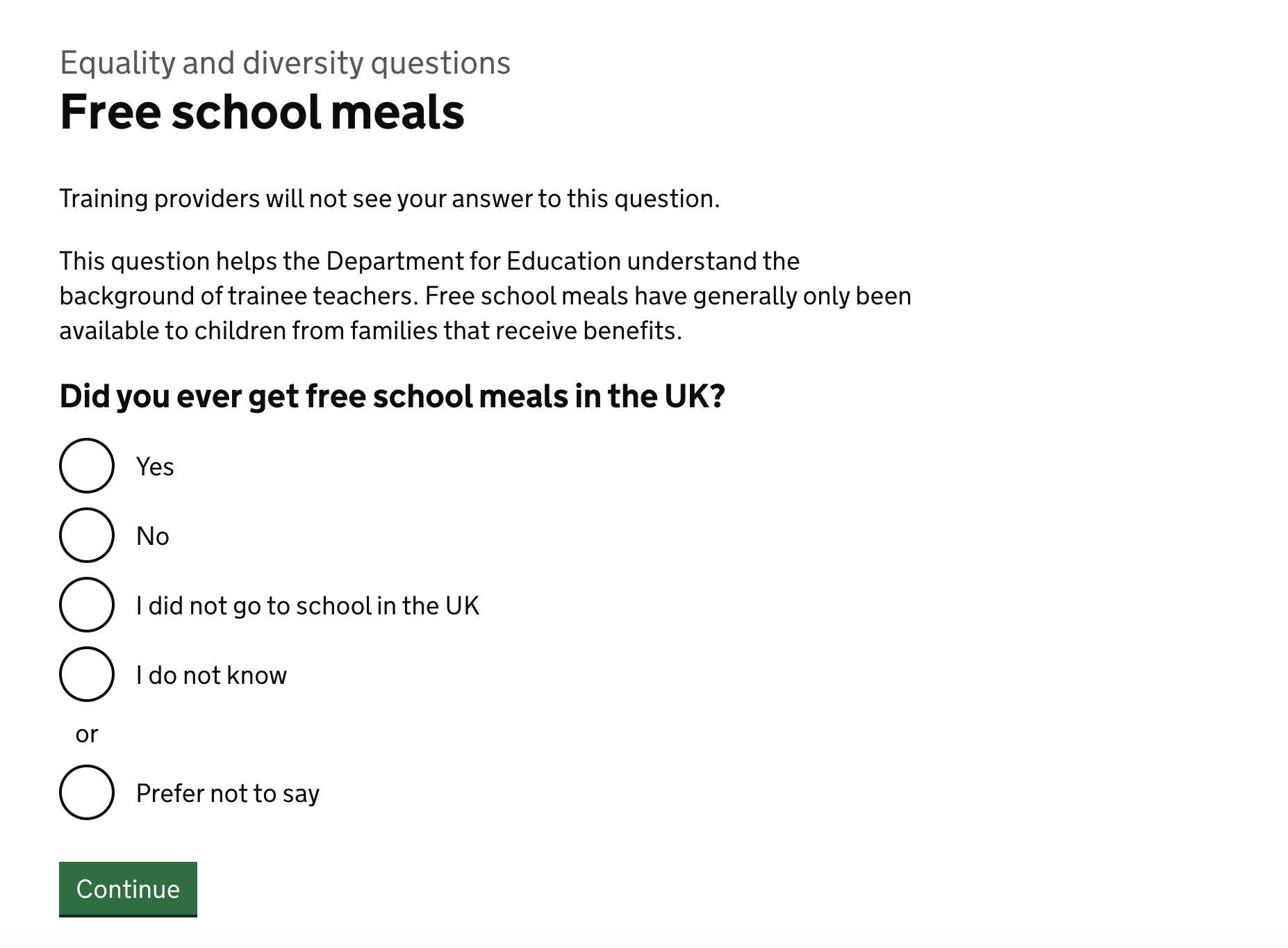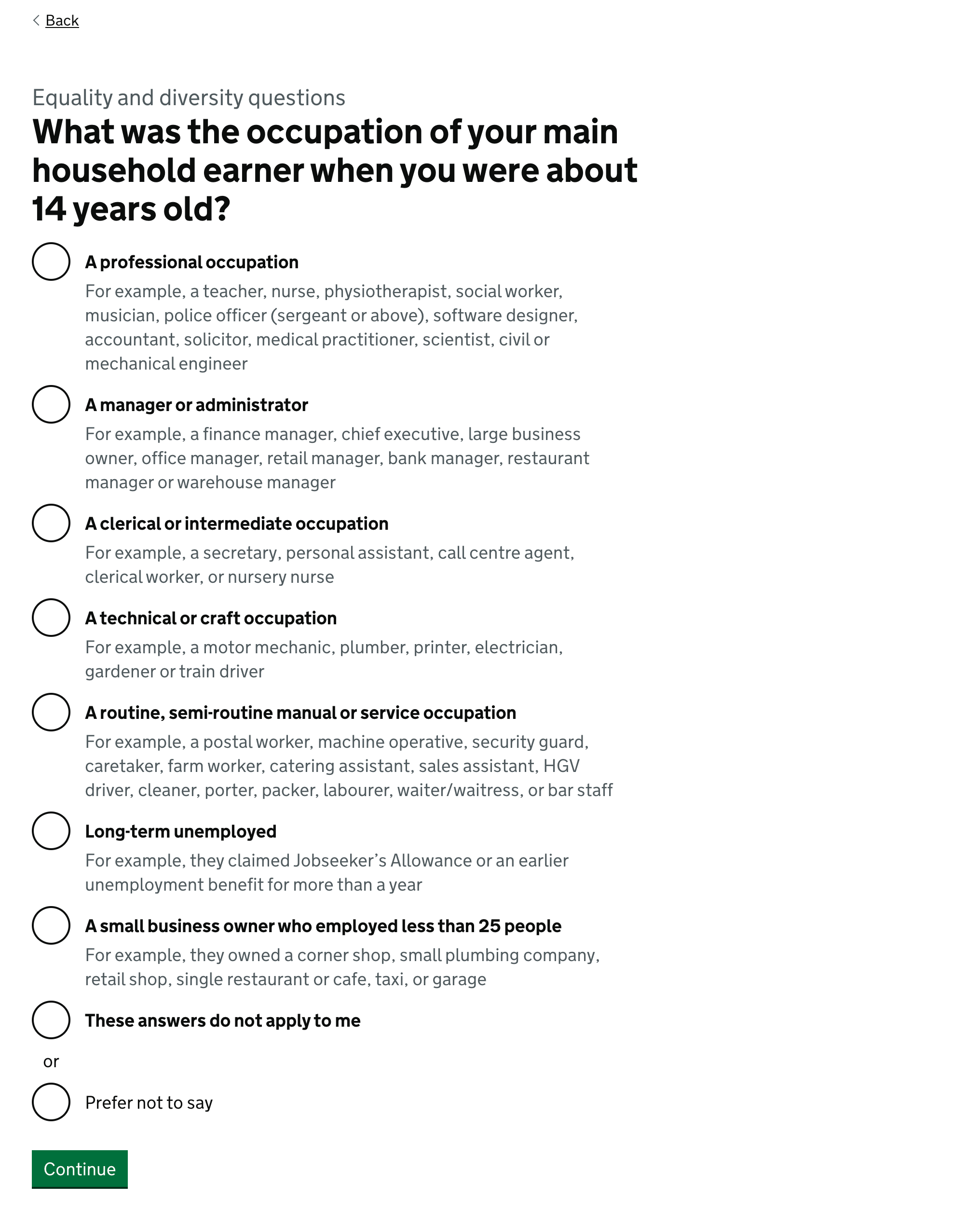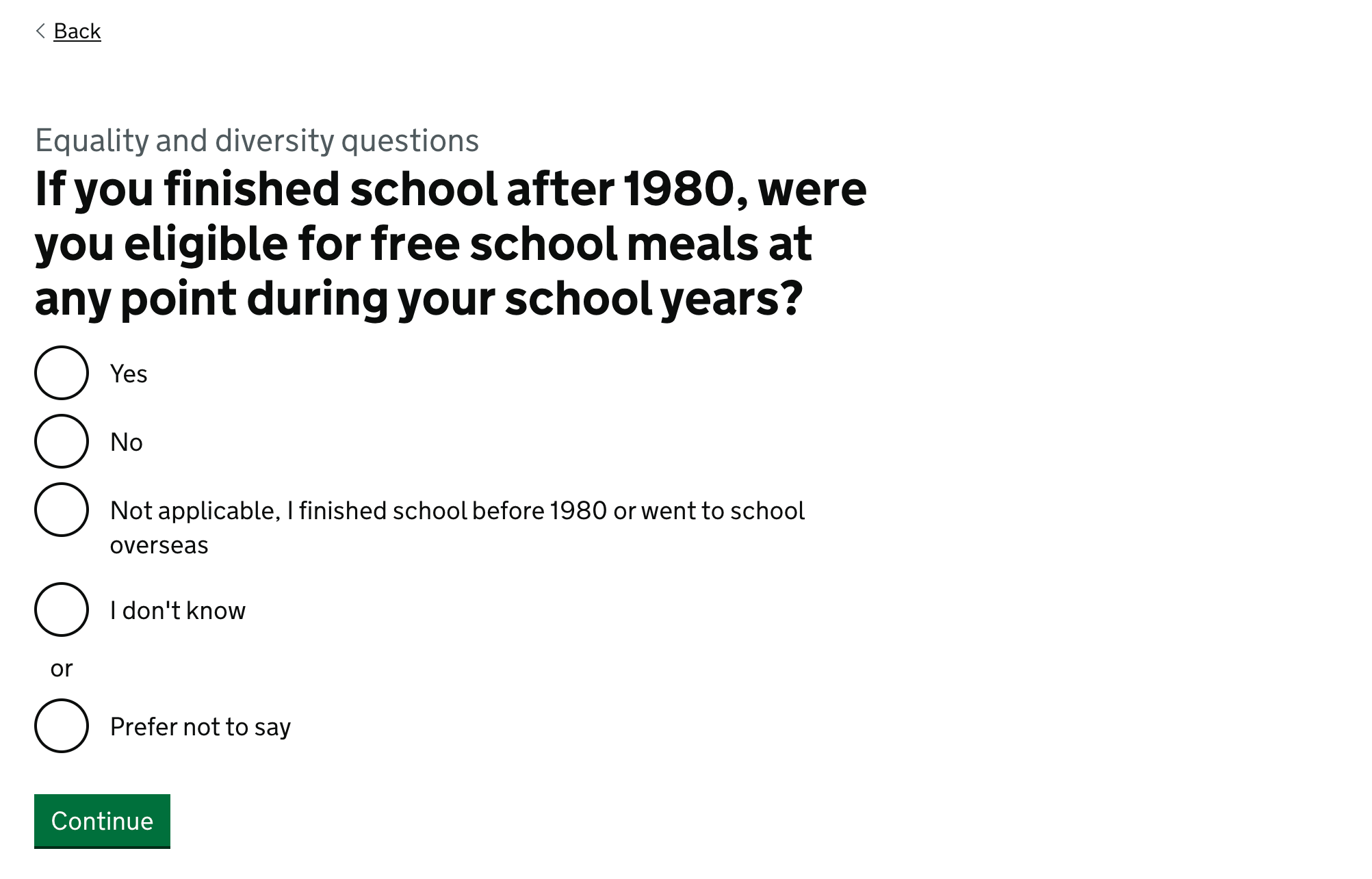
We have started asking candidates whether they received free school meals at school, in order to try and assess the impact of social-economic background on the chances of a successful application.
This change was made on 11 October 2022, when candidates could start submitting applications for the 2022 to 2023 recruitment cycle.
The issue
When submitting an application, we ask candidates some optional questions to assess the diversity of candidates and the impact of policies which aim to help prevent discrimination in teacher recruitment.
Previously, we asked for:
- sex
- disability
- ethnicity
We were asked to investigate whether we could also add some questions to assess social-economic background. This is a hard-to-define measure which encompasses things such as family income, social class, education and the occupation of someone’s parents.
As well as giving us more understanding of the diversity of our applicants, social-economic background data may also help us to better understand the drivers of some of the disparities we see between different groups of applicants applying for teacher training courses.
What we did
We researched different ways of assessing social-economic background, and settled on a single question about whether someone received free school meals.

This is a proxy measure of social-economic status, as children have been eligible for free school meals if their families have been in receipt of certain benefits.
The question is only shown to candidates who have British or Irish nationality, and who were born on or after 1 September 1964. This is because candidates who do not have British or Irish nationality are more likely to have gone to school outside of the UK, and candidates born before September 1964 are likely to have finished school before the free school meal policy was introduced in around 1980. These aren’t perfect criteria, as someone could still have gone to school in the UK despite not having British or Irish nationality, but are a compromise to avoid asking lots of people a question that is not relevant.
As a candidate could have British or Irish nationality but still have gone to school outside the UK, we added a “I did not go to school in the UK” answer, and included “in the UK” within the question text.
We added an “I do not know” answer if candidates cannot remember whether they received free school meals or not, or were unaware whether the school meals were free or paid for.
The question includes the word “ever” as someone’s eligibility for free school meals may well have changed during their school years, and in this case we wanted to be clear that they should still select “Yes”.
We added some content to explain that, unlike the other existing equality and diversity questions, we are not revealing the answer to this question to providers if an application is accepted. This is because the information is not required by providers to submit data to the Higher Education Statistics Agency (HESA).
We also added an explanatory paragraph about why we are asking this question so that candidates understand that we are not directly interested how people got meals at school, but what it indirectly means about someone’s background.
Alternatives we considered
We started by looking at the guidance from the Social Mobility Commission, who suggest 4 separate questions with 1 ‘key question’.
We did some usability research to test 2 of the questions.
In the first question, we used the suggested question to ask for the occupation of a candidate’s main household earner.

In the second question, we used the suggested wording to ask if they were eligible for free school meals at any point during their school years.

In the research, we found issues with both questions.
With the first question we found that:
- some participants found “main household earner” difficult to understand, particularly those whose first language may not have been English
- participants were unsure which option to select if their parents had multiple jobs
- the “when you were about 14” part of the question was sometimes not read
We also observed that the question took longer to read and answer than the other equality and diversity questions.
We were additionally concerned that the categories were not always clear, and some of the labels may be interpreted negatively as value judgements.
With the second question we found that:
- “if you finished school after 1980” tripped participants up and was misunderstood, sometimes causing candidate to not read the read of the question
- participants would answer Yes or No even they went to school outside the UK, instead of selecting “Not applicable”
- some candidates would answer Yes or No even if they were not sure
With both questions, some candidates thought their answer would be taken into consideration by the provider, for example by assessing whether or not they could relate to the children they were teaching.
After the research we spoke to colleagues at the Office for National Statistics, who are also doing their own research on these questions and will publishing their findings and recommendations in future.
Based upon this, we decided to:
- only ask the question about free school meals for now
- filter out candidates who likely finished school before 1980 so that we could remove that part of the question
- filter out candidates who likely went to school outside the UK, using nationality as a proxy, and for those that remain, make it clearer that the question only applies to free school meals received in the UK
- ask candidates whether they got free schools instead of if they were eligible for them - whilst people might choose to never eat free school meals even if eligible (for example, opting for a packed lunch) we considered that this was unlikely and a worthwhile trade-off for a an easier to understand question
Initial results
As of 17 November 2022, 7,289 candidates have answered the question.
Of those:
- 69% answered “No”
- 20% answered “Yes”
- 6% answered “I do not know”
- 3% answered “Prefer not to say”
- 3% answered “I did not go to school in the UK”
A further 1,934 candidates (20% of the total) were not shown the question as they did not have British or Irish nationality.
Further considerations
We plan to review the results after one year of asking the question. We’ll look at:
- whether candidates who received free school meals were more or less likely to be offered a place, or to accept a place
- how the proportions of candidates who received free school meals compared with the general population
- if this data helps inform potential policy interventions
- whether the level of “I do not know” and “Prefer not to say” answers is acceptable
- whether we could avoid asking candidates this question by connecting to existing data held by the Department for Education
We’ll also continue to talk to colleagues in other organisations who ask this question, such as the Social Mobility Commission, the Office for National Statistics and Teach First, to share our learning.
We’ll then decided whether to continue asking the question, or to amend or remove it.